Gutsy Geeks Speak Linux
by Paul Arnote (parnote)
Out there, in the middle of the Sonora Desert, a beacon blasts out truth and testimony to everything that is good with Linux. Three brave souls dare to venture against the "mainstream" of society, swimming upstream against what is popular in the currents of modern computing. They dare to be different in a world that is dominated by Microsoft and Apple. They want you to – at the very least – give Linux a try. And their message can be heard every Saturday afternoon, as they hit the airwaves with yet another round of reasons Linux is a better choice.
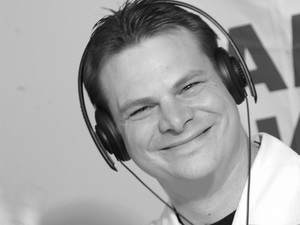
Michael Cady
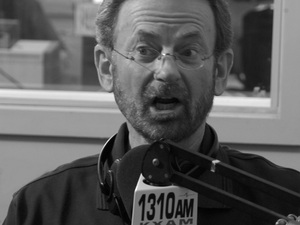
Richard A. Sherman, a.k.a. Mr. Modem
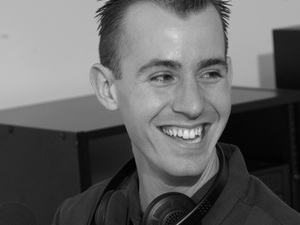
Nick Coons
These guys are The Gutsy Geeks. Every Saturday afternoon, their voices are lifted into the heavens, soaring above the Sonora Desert, delivering the message about open source software, and Linux. Their show can be heard on News/Talk KFNX 1100 AM in Phoenix, AZ, from 2 p.m. to 3 p.m. (Mountain Time, or -7 GMT). Their computer talk show is the ONLY show in the United States that deals exclusively with Linux and open source software.
Started in 2001 as the PC Talk computer talk show, they made the switch to covering the open source and Linux communities exclusively in January, 2008. In a news release from November 28, 2007, show co-host Michael Cady says:
BIG NEWS - PC Chat, which has been on the air for over 6-years now, will be changing it's name to Gutsy Geeks (gutsygeeks.com) in Jan08. Our format will be switching over to exclusively Linux and Open Source based content.
The new focus of the show will be to inform users of the advantages of switching to the Linux operating system, and once they have converted, how to use it to its fullest potential.
I am looking forward to the changes. We have new sponsors coming on-board and tons of fresh content. We will be reviewing Linux products, software, books, websites and companies involved in Linux or Open Source projects.
I want to thank all you loyal listeners for putting up with us over the years, and I sincerely feel that this upgrade will be better for all of us!
- Michael
And switch they did. They made the on-air announcement the very next show, airing December 1, 2007. Some excerpts from that show:
Michael Cady: Open source is a philosophy. It's what governs Linux, the operating system, which is a replacement for Windows or Apple's OS-X. This is not a program you install in Windows, or install in Apple. It is an entire system that runs your computer, called Linux. It's actually pretty closely related to Apple, if you look at its core programming. The point is, this is an alternative, and it's governed by something called open source, rather than proprietary software, and the vast majority of applications that you run in Linux ... thousands upon thousands of them ... are all open source applications, which also give you the same immunity from legal ramifications, and the cost.
Mr. Modem: That you can't beat.
Michael Cady: C'mon. If you want a new program for editing video, then you just click in your package manager in Linux and download it. You don't drive to the store and buy anything, just to find out you don't like it.
Mr. Modem: I think that the concept that a lot of people just can't quite grasp, because it seems like there's something wrong ...
Michael Cady: ... because it's free?
Mr. Modem: ... it's free. Like, what's the hook? Something's going to get me, and there's got to be something somewhere.
Michael Cady: Let me explain that, because it's not free. It's free to the masses. Trust me, there are programmers out there being paid TONS of money by all kinds of companies, governments, schools, organizations, who have a vested interest in open source software. They are being paid. They are being paid big bucks to develop this software. They are just not being paid by you. They are being paid by somebody else, that's all. It's just a different business model. They make money a whole different way in Linux and open source than they make money at Microsoft and Apple. But they are still making money, and everybody is still happy.
...
Most people in Linux go by something called FOSS, which is Free and Open Source Software. That's what most advocates of Linux will use, and profess for other people to use, so that you have no legal ramifications for piracy or copyright issues, or nothing like that, and you don't have that price barrier between you and what you want to accomplish. Because, honestly, I don't think a lot of people do things with their computers because they don't want to spend the money for the software.
Say, I've goofed around with this stupid photo editor that came with my digital camera for two years. And it just does not cut it. It just does not do the things I want to do with a photo editor. Well, if I want to step up to something like Photoshop, for example, by Adobe, in Windows, that's an $800 program. I'm not talking about Photoshop Elements. That's sad. I mean the real Photoshop. That's too much money, and the odds are even if I liked photography a lot, I'm really getting into it, and I might even want to explore it as a career or a part-time thing doing weddings or something, the odds are I'm not going to spend that kind of money to see if I like that software. Now in open source, that constraint is instantly removed. So whether you need an entry level application for a beginner, or a professional tool, they are all free and open source applications.
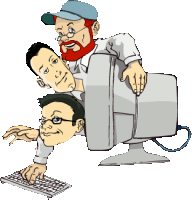
Mr. Modem: And isn't it true too, that with a Linux based app, if you need to uninstall or remove it, it disappears cleanly, as opposed to ...
Michael Cady: Yeah, it has to do with the package manager.
Nick Coons: Right. When you install an application from the package manager, it keeps a log of every file that it puts on your system, so when it goes to remove it, it knows exactly what to pull out, and it pulls everything out cleanly. So you can go through and try 10 different photo editing programs if you wanted to. Once you find the one you like, you can unistall the other nine, and your system is no worse off for that.
Michael Cady: You're right. But you're not going to do that with proprietary software. You're going to go out an buy 10 programs? If you buy one that really stinks, you're still going to use it. What I hear over and over from people, is "I bought that stupid, crap program Norton ... I HATE IT ... IT'S HORRIBLE." But why you running it? "Well, I paid $79 for it, and I'm going to get my money's worth out of it." How much does it really cost if you are angry every time you use it?
Mr. Modem: Right, and Norton's a great example. Then when your license is up at the end of the year, try to get rid of it. Good luck removing it. Oh man, what a nightmare.
Michael Cady: Another great example of the package manager in the LInux operating system, versus Windows or Apple, is that the package manager in Linux keeps track of updates for ALL of your software, not just your operating system, and maybe your browser or maybe your office suite. So, using the package manager, every program you install with it, whether it's a game or edutainment tool or whatever you are trying to accomplish, you have 30, 40, 50 programs in your computer, and your updater updates ALL of them. But here's the core difference -- it doesn't just update security flaws and problems, which is usually the only updates you're going to get for Windows, is fixing a known security issue. The updates through your package manager don't just fix things, it offers improvements. So whenever you want to update a program, you can not just say fix a problem with it, but you have the opportunity to actually make it better. Because, in open source, they don't have to wait every two or four years to make you buy a new version to get new features. They can release them to you as they become available. So if you're wishing for this new feature in your photo editor, you don't have to necessarily wait for three or four years for the next version to be sold to you. It may be available in two weeks in an update if enough people want that done. It's easier to learn and grow with your software, than getting hit over the head with a hammer to have to learn a new application, or a new version of your application every few years, when they change so dramatically all at once.
Mr. Modem: Like Office 2007 just did that ...
Michael Cady: Oh good luck!
Mr. Modem: It's just making people nuts.

Michael Cady: It is. So is Internet Explorer 7. Because, they hit you over the head with all these changes, where in open source, you get hit with little changes released over time, so it's easy to slowly grow and adapt and to become a more sophisticated user, a more capable user. The open source philosophy makes so much more sense than proprietary (software). There's always exceptions. We're not here to say this is for everybody, but I genuinely believe that the vast majority of the population, in excess of 70 to 80 percent of people, would be better served using open source software, as opposed to the same-ol' same-ol'.
Mr. Modem: It's a different model, and it's time for a change.
Michael Cady: It is. (continues after a commercial break) And, if you haven't noticed, the show has taken a decidedly open source/Linux slant over the last six months or so, and we're pushing more and more that direction, because our mission as a show, from the beginning, has always been to recommend what we think, honestly, is best for you. So, instead of you having to figure everything out on your own, we will at least give you our opinion on what we think is best. And, we've treaded kind of softly, I think, in the Linux world. up until recently, because we just didn't feel that it was ready for most people to use because of the interface not being quite as polished and friendly as what you're used to with new versions of Windows and new versions of OS-X. But, we're here to say that that has changed. Here in the last year or two, the progress made on the desktop environment in Linux is tremendous. We think it's time that everyone give it an honest shot. Now we're not trying to turn you into nerds here. We don't want you to be installing operating systems and tweaking device drivers and doing settings.
Mr. Modem: Your head would explode.
Michael Cady: Yeah. If you don't do that already in Windows or in Mac, then we're not suggesting you become a nerd in Linux all of a sudden. While your computer may have come with Windows on it, most of you would have some difficulty in installing it properly, from scratch, and getting all of your updates and drivers and things put in place the way they are supposed to be, to be sure you have full functionality of your machine. So, if you're going to install Linux, which, by the way, will run on pretty much any PC that Windows will run on, but if you're not really savvy with the technical side of computing, we don't really suggest that you begin that today.
Mr. Modem: No, no, no, no.
Michael Cady: So have a friend, or an IT person, or a business, help you get started with Linux, and offer you some support to get you headed in the right direction.
Mr. Modem: In the weeks and months ahead, we're going to be talking more about the basics and getting started and where to go for help, help resources, and kind of be your one-stop-shop for everything Linux.
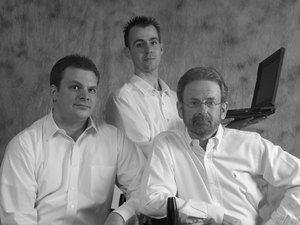
Michael Cady: Exactly true. We're going to slowly be transitioning over the next month or so, but to start the new year, in '08, the show will transform into, pretty much exclusively, a Linux and open source based program. But the new format is going to be really exciting. I'll go over that with you. We're going to be highlighting on the show here in the future, is, as a guest, which is almost like we've always done and have guests on, but these guests will be from open source and Linux based companies, or at least companies that embed Linux in their products, etc. There will have to be some type of Linux or open source angle to the guest to be on the show.
Mr. Modem: And you'll probably be surprised at how widespread Linux really is running behind the scenes.
Michael Cady: Oh, man!
Mr. Modem: Most people don't know that.
Michael Cady: They have no idea that it's already completely in their lives. As well, we'll be doing a product review. Each week, we'll pick a product, whether it's something like a TIVO, or whether it's a peripheral for your PC, or it could be any number of things. It could be a new cell phone. Some physical device, that uses Linux or open source software.
Mr. Modem: And, if you're looking for something specific, and you can't find it, or if you're just curious if it exists in the Linux world, just send us an email, and we'll be glad to do the research and find out.
Michael Cady: This show is all about being interactive. We thrive off of your feedback. If you have a question, an idea, a concept, a suggestion, just please send it over to us via email, and we will take it very seriously. ... So then, we'll be reviewing a product each week. As well, we'll be reviewing some software.
Mr. Modem: We've talked about the thousands and thousands of software programs, and for people that are using Windows, or have been using it for years, if you want to know what the equivalent is, or what if I'm using Quicken, what should I be using if I'm using Linux. And that is the type of information we're going to be bringing to you.
Michael Cady: All the pros and cons, because sometimes there are cons to using open source programs. Not just any particular one. It's a good thing that you have a lot of choices in open source, but there's cons in everything else. There's lots of cons to Windows, like getting viruses constantly, maybe. And there's lots of cons to Apple, like paying through the nose for everything, maybe. So there's a down side to everything.
Mr. Modem: And we'll be real fair in assessing it. If there's something we don't like, or we think could be better, or that doesn't work well, we'll bring it to you. It's not going to be all "rah-rah" all the time.
Michael Cady: No, no, no. We're going to try to give you a balanced view, the best that we can. We obviously are big fans of, and love, open source software, but we know that it's not perfect. And there are some down sides. But those are minuscule in comparison to the down sides from being infected constantly.
Mr. Modem: Yeah, that gets old.
Michael Cady: And removing spyware, and spending half of the time on your computer trying to fight back, just to use it. So, we'll be reviewing programs for you, and there are so many good programs out there, but we're going to keep it mostly to the beginner level. We'll also be reviewing web sites, because in open source, there are just a multitude of sites that will help you recommend particular applications, based on what you are familiar with, or what you are trying to accomplish.
Mr. Modem: There are a lot of great help sites, where you can turn to to ask questions, on message boards, forums, and that type of thing.
Michael Cady: Oh, it's brilliant. And the community, just because of the nature of open source is all about people working together, and because of that, there is this really rich, online community that will help you solve just about any problem you can come up with in Linux or open source. As well, we'll be keeping you up-to-date on events. We'll be focusing on large Linux gatherings around the country, whether they are like Linux World, which is was just about six months ago in San Fransisco, that was a tremendous event. They had the Ohio Linux Fest not that long ago. We'll let you guys know about the big events, or even local ones throughout the Phoenix area, where we're at. As well, about things like classes and opportunities for you to learn, like a lot of libraries ... schools are now offering Linux, even for beginner classes ... we'll be talking about new books that are out, things that will be relevant to you as a user.
Mr. Modem: And new things, new developments. Like if a new version of something comes out, we'll talk about that, and those types of things, just to keep you apprised.
So just who are these computer mavericks?
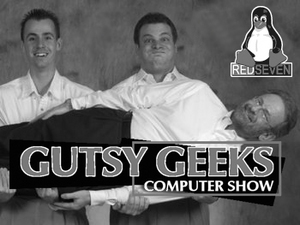
Michael Cady - starting with a Timex Sinclair computer more than 20 years ago, he's been interested in computing ever since. Co-owner of the RedSeven computer company in the Phoenix area, Michael helped found KidComputers, a charity that recycles older, used computer equipment and donates that equipment to underprivileged kids in the Phoenix area.
Nick Coons - known as the resident "geek," Nick learned programming when he was eight years old. His love affair with computing has grown ever since. He is the co-owner and CEO of the RedSeven computer company, with Michael Cady. Nick's computer skills include networking and programming in DOS, Windows, Linux, and Unix.
Richard Sherman, a.k.a. "Mr. Modem" - getting his start with computers in 1981, Richard has risen to great heights in the computing world. He writes the nationally syndicated "Ask Mr. Modem" newspaper column, is a featured columnist each month in Smart Computing magazine, publishes an award-winning "Ask Mr. Modem" weekly newsletter that reaches subscribers in 38 countries with a readership of more than three million readers every month, as well as being the author of eight books. He has also written articles that have appeared in The Reader's Digest, Wall St. Journal, USA Today, Money Magazine, the AARP Magazine, and numerous web sites. He even hosts the "Mr. Modem Minute," produced by FOX-TV.
If you feel that you have been missing out on these guys, have no fear. Most of their previous shows are archived on the Internet for you to listen to, or even download, at http://www.gutsygeeks.com/audio. All the available shows are in MP3 format, and the archived shows from May 3, 2003 to present are also available in OGG format. Shows prior to the January 13, 2008 show are archived on the web site bearing their former name, PC Chat Show (/http://www.pcchatshow.com/audio/). You can also listen in live to the show on Saturday afternoons, by going to http://www.1100kfnx.com/ and clicking on the "Listen Live" link at the top of the radio station's web page.
Truly, these guys are easy and a joy to listen to, and the hour long show is over long before you realize that an hour has passed. Not only that, but they are funny, and offer many insights into the reasons that listeners should be running Linux as their primary operating system. It's also apparent that there is little love loss for Microsoft, Apple, and other vendors of proprietary software. And, if you find these guys informative and entertaining, their guests are a veritable who's who in the open source software and Linux community. One recurring guest on their show is Richard Stallman, founding president of the Free Software Foundation, launcher of the GNU Project, and author of the GNU General Public License.
In a world dominated by proprietary software, it is truly refreshing to hear three voices of reason, championing the use of Linux and open source software.
